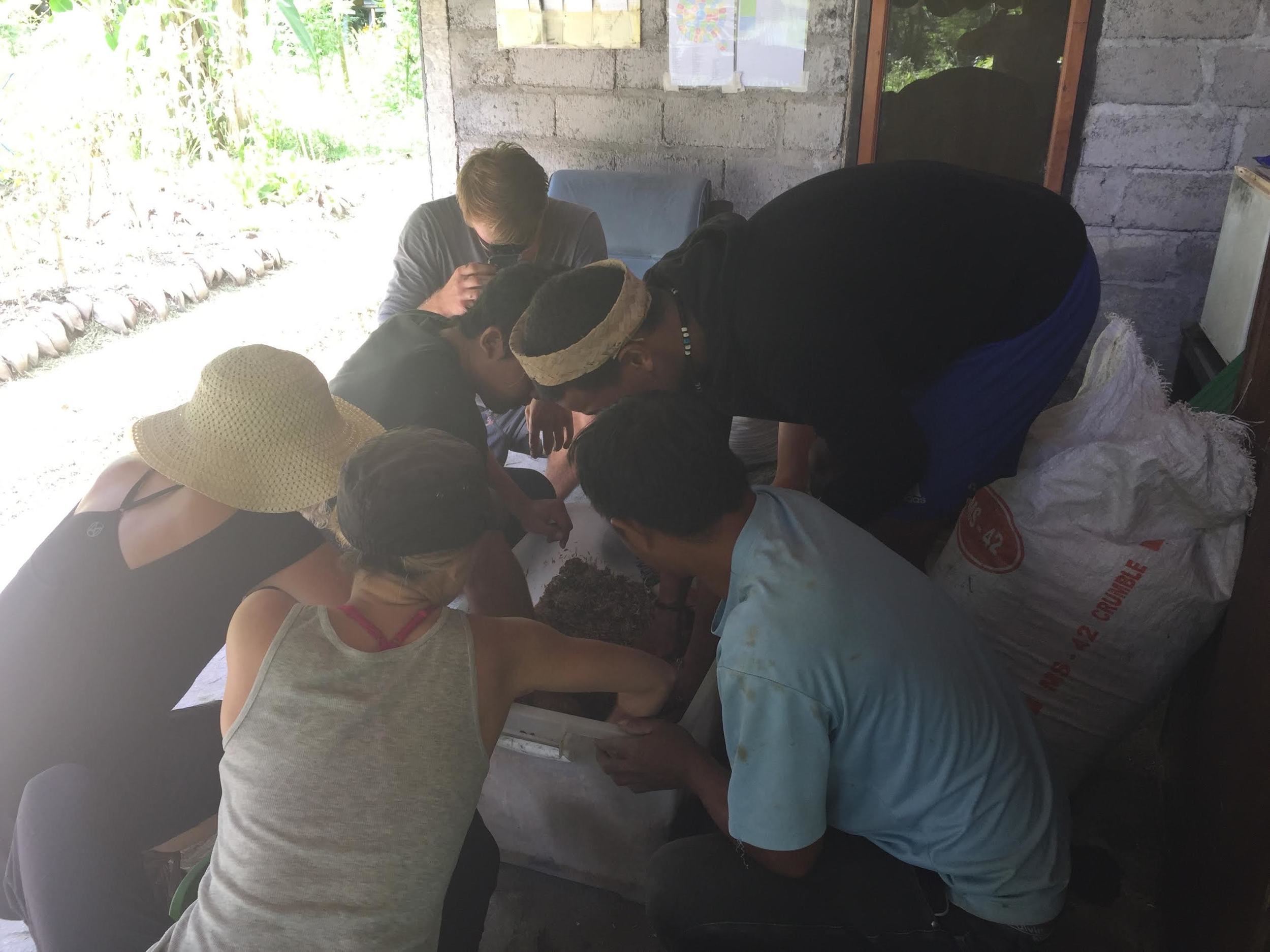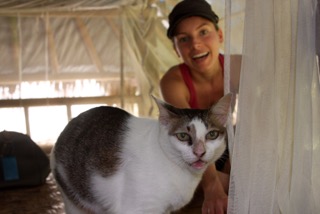Taking care of the elephants
/Taking good care of
i’s elephants. Shannon, our volunteer, and Sabine, our Austrian volunteer have taken on the task of cleaning one of our elephants lads from the dust fallout from the volcanic ash which came down a few months ago. The elephant lady is getting a thorough bath and cleaning to let her shine agin in her grey coat.
Our very own Rosella Tea
/The roselle or asam belanda (Hibiscus sabdariffa) is a species of hibiscus, and in Malaysia it is often referred to as "Ribena plant" as roselle juice tastes similar to Ribena. It can grow up to 2–2.5 m tall with wide leaves that are deeply three to five-lobed. The leaves and young shoots can be used in cooking.
The red calyx is harvested to make rosella juice, syrup or jam. We use if for making tea. Simply peel the calyx and remove the seed capsule and pour hot water on top of it.
Two year research on the coconut beetle
/Here we have described in detail our research and holistic organic treatment to reduce the numbers of the damaging beetles in our trees. Oryctes Rhinoceros L. is an endemic pest of Asia that causes devastating damages to coconut palm tree plantations. What is the effective method to organically and naturally reduce the number of coconut beetles? We would like to share with you the results.
Please, see here the English version and here the version in Bahasa Indonesia. For consultation and treatments, please connect with us> jiwadamaibali@ gmail.com
Making Bokashi Balls for Our Pond
/After removal of all and cleaning the pond, we began to make Bokashi balls. These would be placed under the big stones to allow the Effective Micro-organisms(EM) to settle into the stones.The Bokashi Balls are made of clay, rice bran and EM. We are happy to share with you our method of making this highly useful Bokashi balls.
10 clay soil
1-2 rice bran
1-2 EM mixture with water
Cleaning the pond
/Jiwa Damai is surrounded by beautiful ponds teeming with life. However, due to the ash coming down with the rain from the last volcanic eruption on the neighboring island, our stones in the pond, which are full with algae were covered completely with the ash. The fish feed on these algae and all of a sudden there was no food left. The ash also prevented the algae to receive light and hence they did not grow anymore.
We had to search for means how to remove the ash from the stones. A water vacuum machine we bought did not do the trick.
The only other way was to empty the pond and clean it out. This was sad, since the pool had developed its own micro climate with its various inhabitants, and we had to destroy this. The stones were also the seat of many micro organisms, especially EM. Having this micro climate surrounding the buildings of Jiwa Damai, prevented mosquito larvae from hatching and both large buildings were nearly mosquito free.
These ponds are the pride of Jiwa Damai, teeming with life, surrounding our main building and giving it its unique charme. They have a concrete base and the large river stones were added later to provide hiding for the fish and our eel as well as many crabs and frogs. To keep the water clear we had added many bags of Geolite, a stone in ground down form, which draws dirt to itself. All these needed to be considered
1. Catch all the fish and other inhabitants and take to neighboring pool
2. Remove all the stones and clean from ash
3. Remove Geolite bags and clean
3. Clean the pond floor from the ash
A huge job awaited us!
Yoga Teacher Volunteer at Jiwa Damai
/Our lovely yoga teacher volunteer, Bee at Jiwa Damai is sharing some of her thoughts with you regarding her experience here. She has been our “busy bee” for the last couple of months helping us start the day with yoga in the morning and teaching our local team English. Originally from Austria, Bee has been traveling in order to find her path as a yoga instructor. We are very grateful for all the positive energy she has brought to this place.
You can find out more about our volunteer program here or just follow the stories from our volunteers on the Jiwa Damai blog. In the meantime, we invite you to discover the way Bee has experienced her stay at Jiwa Damai.
What made you chose Jiwa Damai? I was searching for a place to practice yoga and to teach, for a healthy environment. I believe that yoga is a lifestyle and in order to follow it, you have to select carefully your surroundings. At the same time, it is hard to find a place where you can start with teaching when you don’t have prior experience. I was reading that Jiwa Damai is looking for volunteers and that they offer yoga in the morning so I thought that I could start to teach and also learn more about yoga here. The beautiful part is that they offered me this chance! I’ve been at Jiwa Damai for almost two months now. And I am happy to say that I had my first yoga students here.
What are the things that you appreciated most in your experience at Jiwa Damai? At Jiwa Damai I liked the fact that I could get new experiences. Not only as a yoga instructor. Margret asked me if I can teach also English. When you are not very confident with speaking a language, you would not expect such an invitation. My English is not perfect but by preparing the lessons, I had the chance to improve it and share my knowledge with others. I could develop new skills in an area where I could not imagine that I would be able to do so.
I also appreciated the fact that I could eat food from the garden. At the same time, I worked in the garden and saw how the things are growing. I’ve cleaned the elephants and the stones. One does many things. But this is how one gets a feeling for plants, for the environment, for the nature. I think there is a lot to learn at Jiwa Damai and two months is not enough.
It is nice to see how the plants grow, how people grow, not only the volunteers but also the local team. Even after the first three weeks, you can see a difference.
What should a yoga teacher volunteer expect coming here? I think a yoga teacher volunteer should just be opened. If you want to learn something, there are so many things you can learn. It can be gardening, teaching, interacting with people with different cultural backgrounds. I believe everyone experiences Jiwa Damai in their own way.
On the one hand, you live here, you find new friends, you feel at home (when you are traveling you really need this), and on the other hand you are traveling in your days off and you can discover Bali and its rich culture.
What do you think it is unique about the volunteer program at Jiwa Damai?
What I really like actually is that people get here their own projects and Margret lets them discover it by their own. People get here projects according to their interests and skills. Cat did a wonderful research on the coconut beetles, Cedric is researching on cacao. I was developing teaching skills. So if you are curious, Margret gives you the space and the support to explore and create something nice on your own.
Bee (yoga teacher volunteer)
Our volunteer with Orchid, the cat
/Sabine, our Austrian volunteer Yoga teacher is visiting our cat Orchid in her home the Garden Lumbung. Orchid has made this her home and is receiving every volunteer staying there with joyful greetings and meowing. She talks a lot and takes immediately to the warmest place where the person sleeps.
She is a great companion and extremely gentle.




















